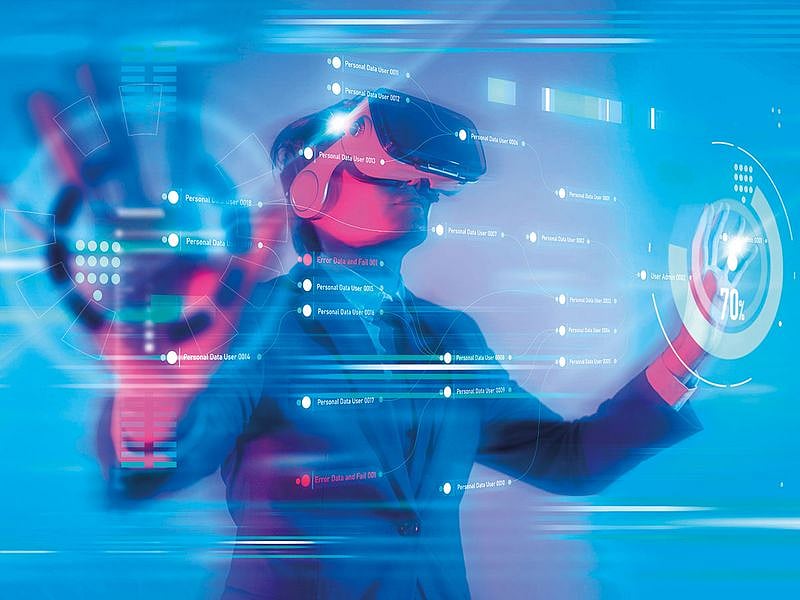Dubai’s metaverse push enters next phase: Where the strategy stands
Early gains in jobs, regulation and virtual services show momentum

When the Dubai Metaverse Strategy launched in July 2022, the ambition was clear: turn Dubai into one of the top ten metaverse economies globally, support more than 40,000 “virtual” jobs by 2030, and generate a significant contribution to the emirate’s GDP.
Now, in 2025, it is time for a check‑in: what has been achieved, what remains in progress, and what it means for the UAE and Gulf region.
Ambitions set out in 2022
The Strategy spelled out several major targets: attract and nurture companies working in blockchain, Web3, and the metaverse; boost digital‑talent development; integrate immersive technologies
(AR/VR/MR/digital twins) into public services, education, tourism, and retail. Specifically, the ambition included supporting over 40,000 virtual jobs by 2030 and making the metaverse sector contribute around $4 billion to Dubai’s economy.
What progress can be seen now
Several indicators point to meaningful movement forward.
Regulatory and institutional groundwork: The Virtual Assets Regulatory Authority (VARA) has reportedly established a “Metaverse HQ” in the virtual space as part of Dubai’s proactive governance approach to emerging technologies.
Job‑ecosystem awareness: Roles like digital architect, world‑builder, virtual customer‑service agent, and remote metaverse tutor are now being advertised, signalling that the “virtual jobs” ambition is taking practical shape.
Real‑world deployments: Dubai’s metaverse infrastructure is being used by public‑service bodies for virtual workplaces and customer service. Examples include the “DewaVerse” by the Dubai Electricity & Water Authority and other immersive government service platforms.
These developments represent early but tangible realisations of the strategy’s pillars: talent, infrastructure, and ecosystem.
Where the journey continues
While early progress is promising, the path to full-scale implementation is still unfolding. Some of the major numeric targets, such as 40,000 virtual jobs and the projected $4 billion economic contribution, are milestones for the coming years, and the UAE is actively working to realise them.
As the metaverse is still an emerging global market, questions around user adoption, business models, and platform interoperability remain areas of exploration rather than obstacles. Dubai’s pilots, from virtual workplaces to immersive government services, serve as practical testbeds that help refine approaches, build expertise, and create valuable insights for scaling.
Infrastructure development is ongoing, including advances in VR/AR, 5G/6G networks, and digital twins, and each deployment contributes to strengthening the ecosystem. The region’s steady and strategic progress suggests that, while full-scale transformation will take time, the foundations being laid today are robust and forward-looking.
Why this matters for the Gulf
For the UAE and wider GCC, the metaverse ambition is not just hype, it is part of a strategic shift that has been consistently spoken about at important events like Gitex since 2021.
For businesses: Entering now allows firms in media, tech, creative services, and real estate to position themselves as early participants in a regional immersive economy. Localisation (Arabic language, Gulf cultural content) may offer competitive advantage.
For workforce and talent: The “virtual jobs” message signals new pathways for employment, including roles accessible remotely from the Gulf. Skills in AR/VR development, world-design, avatar economies, and immersive retail could prove increasingly valuable. This is another modern dimension of growth to the established trend we have been seeing since covid for remote workers.
For government and policy: The UAE’s approach, combining strategy, regulation (through VARA, etc), infrastructure investment, and talent development, offers a model for other Gulf states seeking to diversify into even more digital services.
Final word
Five years out from its 2022 launch, the Dubai Metaverse Strategy is showing clear signs of momentum: the regulatory frameworks are live, new job roles are emerging, and virtual‑workplace use-cases are being rolled out. While the most ambitious targets remain ahead, the progress to date demonstrates that the UAE is treating the metaverse not as a passing trend but as a key component of its digital-transformation journey.
For the Gulf, this early-mover approach offers lessons on combining strategy, innovation, and ecosystem-building, and positions the region to potentially become a leading hub for immersive digital experiences over the coming decade.
■ Chris Redmond is a global tech executive who is now an entrepreneur in the media tech space
Sign up for the Daily Briefing
Get the latest news and updates straight to your inbox
Network Links
GN StoreDownload our app
© Al Nisr Publishing LLC 2026. All rights reserved.